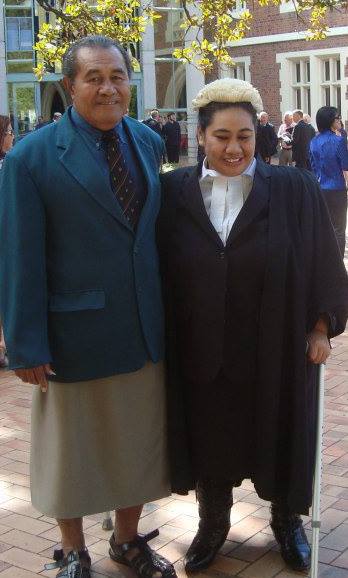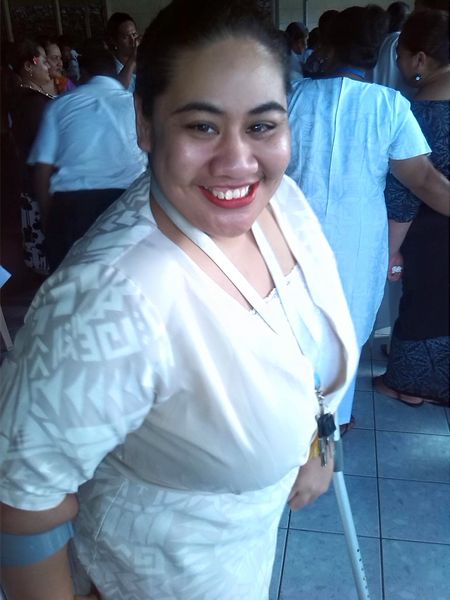Humans Of The Islands - Susana Leota

Susana Leota
32 years old, living in Samoa.
Legal Adviser, National District Health Board
Describe your family background?
I have 6 other siblings and we also often grew up surrounded by lots of extended family. My parents raised us with traditional fa’asamoa values but they also encouraged us to adapt in western society. They taught us to value education and encouraged us to read lots of books. We had to speak politely and use our manners. We often labeled as posh kids by our peers.
Do you have a treasured memory from your childhood?
I attended a school for kids with special needs or who had vision impairment and one year they put on a Halloween party. My parents dressed me up as a little Taupou. I remember it was raining and the treasure hunt went around the whole school. I needed crutches to walk on and my Dad didn’t want me walking the distance in the rain so he piggy-backed me through the whole treasure hunt. That’s one of my favourite memories.
You’re 32-years-old, an independent young Samoan woman, working for the government and you live in an apartment by yourself. Is that something that surprises most people when they meet you?
Yes it surprises people because they think that I should be dependent and that I’m someone who can’t do things for herself. So when they see me living alone they don’t understand why. They either think that I don’t have any family, or that no one loves me. But it’s actually the total opposite. They also don’t realize that I have a high-qualified job and when they do, they tend to think that I haven’t been this way all my life. They assume I was probably born normal and perhaps I had an accident later on life that led to me being disabled.
You must break a lot of stereotypes in other people’s minds.
I have confidence in myself, but people think that disabled people can’t have that. I never thought of myself as being disabled, or different. When you look in the mirror, you see the disability and the traits of being disabled like the crutches etc. but for me I just thought it was normal. Yes it was different, but it was normal to me. In my life, I have thrived and I don’t think I had a choice. You either sink or swim. And my parents always said to me “you don’t want to be a beggar”. People tell me that it’s inspirational that I’m Samoa’s first qualified disabled lawyer and that I work for the government, but I don’t really know why. It’s just like anyone else – you know, you’re born into a certain situation – for me I was born disabled and born a Samoan woman and you just have to do what you have to do to thrive.

Can you explain your medical condition?
I was born with Spina bifida which is a birth defect meaning my spine hasn’t developed properly and I can’t walk without crutches. I am also visually impaired. I wasn’t expected to live past the age of 5 and every time I had a checkup growing up, the doctors were always like “Wow, she’s still alive”.
People were shocked when I reached the age of 10. I don’t think my parents understood the extent of what it would mean for my life. The only thing they understood was that I wouldn’t live past 5. For a lot of people, my vision impairment is not the most obvious disability but it’s the one that impacts me the most when I’m doing my job because I can’t see everything. I either have to have it in electronic form or blown up to A3 – or I start being a Diva and get people to read it for me (laughs).
What kind of experiences have you encountered in the workforce that has surprised you?
In Samoa it can be difficult – in all fairness, having someone like me work as a senior with some authority, it’s never been done before. So some people have had to get used having a new mindset and seeing me differently. Once they get to know me they move past the disability quite fast. In New Zealand environments, I was never judged as a Pacific person, or even as a woman. My disability is the first thing people see. It has blocked any other stigmas that could have been placed on me. I’ve also had to battle reverse racism in Samoa where some people think that because I was raised in New Zealand, I’ve had things handed to me on a silver platter and they couldn’t be more wrong.
Who inspires you?
I think people who are disabled but weren’t born that way are the most amazing people. They know what it’s like to have the full use of their body and then have to adjust to life not having full use anymore. You go through something traumatic like a car accident and then wake up one day and have to pick yourself up and move forward with a disability, to me that’s amazing. Whereas for myself, I don’t know any different, I was born this way. And I’ve never had to adjust to that kind of loss or change, I just had to make something of my life, regardless.
What is your biggest dream?
My biggest dream is to be a wife and a mother – because those things aren’t really in my control. Everything else to an extent is in my control because I can either say – I’m going to wake up and I’m going to go to work today, but being a wife and a mother, you need someone else to want to be in that partnership with you and you can’t control someone else to do that with you.
